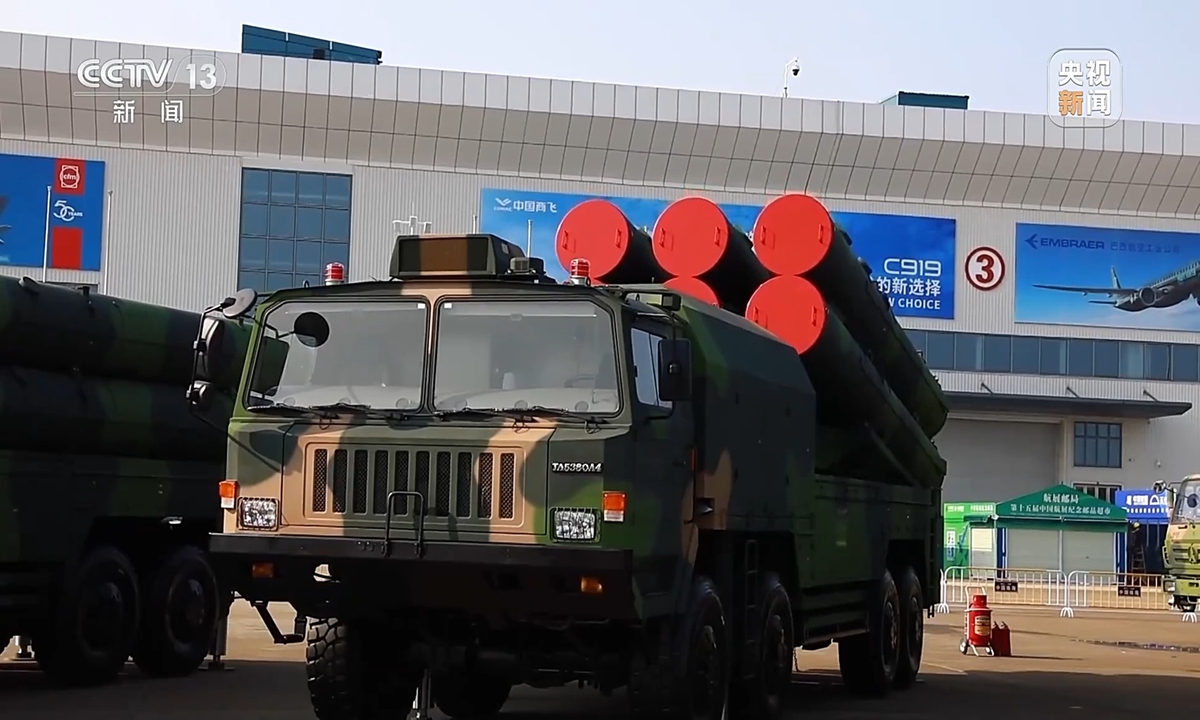
The Chinese People's Liberation Army (PLA) Air Force is set to display for the first time the HQ-19 surface-to-air missile system at the Airshow China 2024 in Zhuhai, South China's Guangdong Province to be held from November 12 to 17, 2024. Photo: Screenshot from China Central Television
The Chinese People's Liberation Army (PLA) Air Force will for the first time display the HQ-19 surface-to-air missile system at the upcoming Airshow China 2024, to be held in Zhuhai, South China's Guangdong Province from November 12 to 17.
Featuring large combat-protection coverage, strong defense penetration and countermeasure capabilities, the HQ-19 is China's new-generation surface-to-air missile system, and is mainly used to intercept ballistic missile targets in a region, China Central Television (CCTV) reported on Thursday.
The launch vehicle of the HQ-19 uses a highly mobile 8x8 wheeled chassis, and each vehicle is equipped with six interceptor missiles stored in storage-transport-launch integrated launcher tubes, CCTV reported, noting that the interceptor missiles use cold launch.
Judging from the design of the self-adaptive launch pad at the rear of the launch tube, the HQ-19 is launched at a large angle close to vertical, CCTV said.
This indicates that a higher level of technology has been applied in the weapon, the report quoted experts as saying.
With the characteristic of "strong defense penetration and countermeasure capabilities," the HQ-19 is able not only to intercept conventional ballistic missiles, but also to counter hypersonic glide vehicles, maneuvering in the atmosphere to penetrate defense, and is capable of intercepting targets at various speeds with a large range, CCTV quoted experts as saying.
These traits showed that the HQ-19 has reached an advanced global level, experts said, according to CCTV.
Chinese military expert Zhang Xuefeng told the Global Times on Thursday that the HQ-19 can generally be described as a dedicated anti-ballistic missile system, while the HQ-9 and the HQ-22, which are Chinese surface-to-air missile systems previously announced to be in service with the PLA, focus more on anti-aircraft missions and have less range in anti-ballistic missile missions.
Zhang pointed to ballistic missile threats in recent conflicts elsewhere in the world, noting that conventional air defense missiles showed limited efficiency in countering ballistic missiles, which is why a regional air defense system dedicated to ballistic missile interception is needed.
The HQ-19 has further enhanced the PLA Air Force's air defense and anti-ballistic missile capabilities, and is just as significant as the J-20, Zhang opined.




